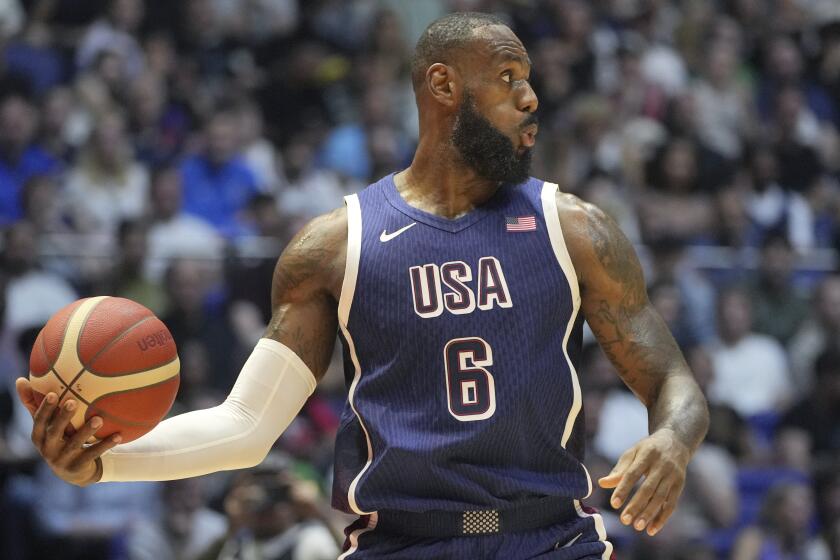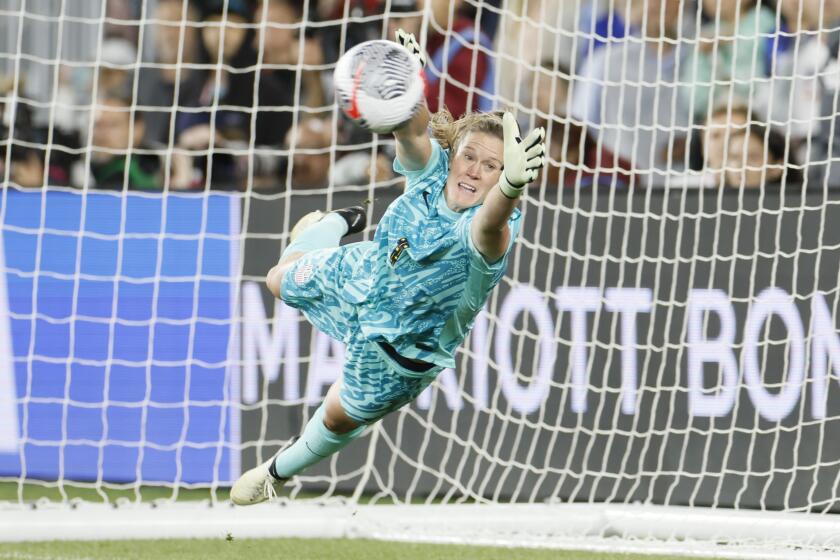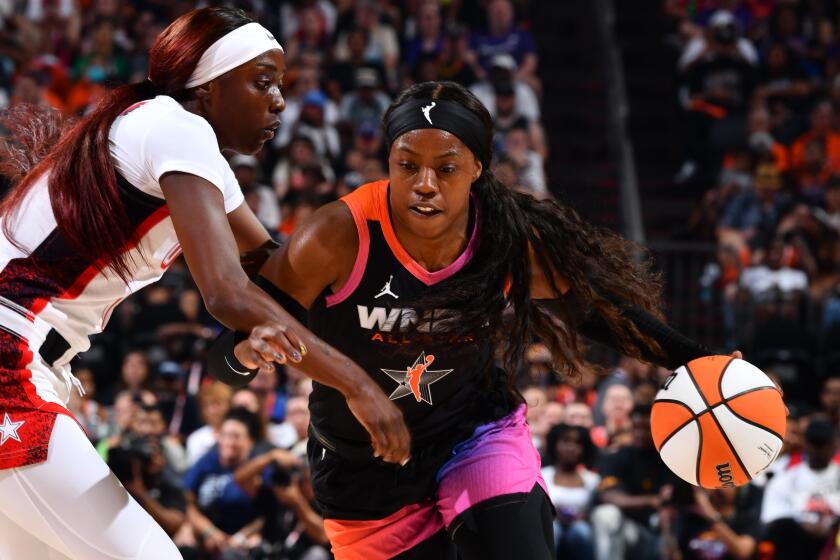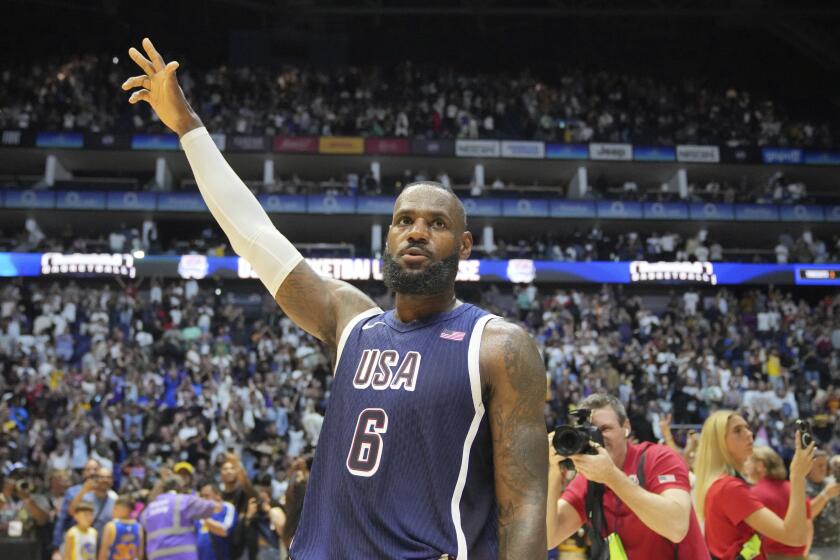Sprint Sun Sets in U.S., Rises in Canada : Track and field: Men’s 100 meters is dominated by North Americans, but the Star-Spangled Banner is not the anthem played at World Championships.
Gail Devers gave the United States its first gold medal by defending her title in the 100-meter hurdles. Otherwise, the second day of competition in track and field’s fifth World Championships was one that North Americans from below the Canadian border would rather bury at the bottom of the nearby North Sea.
The United States can usually depend on Carl Lewis, Jackie Joyner-Kersee and its once-deep well of 100-meter men for medals. But they will not be able to rely on the past here, leading one to wonder if their times have passed.
If there was any consolation Sunday before an estimated crowd of 40,000 at Ullevi Stadium, it was that some others heretofore considered infallible, such as Great Britain’s Linford Christie and Germany’s Heike Drechsler, also appear to be losing grips on their events.
Only hours after Lewis, 34, announced that his screeching left hamstring has convinced him to withdraw from next weekend’s long jump competition and turn his attention to the 1996 Summer Olympics at Atlanta, Joyner-Kersee, 33, was left to contemplate whether she should do the same.
For only the second time since she began competing internationally in 1983, Joyner-Kersee did not win a long jump medal, struggling with various leg injuries to finish sixth and so distressing her coach/husband, Bob Kersee, that he told her to withdraw from the heptathlon competition that starts Wednesday.
If she does not agree? “If Jackie is out there doing the heptathlon, she’ll be doing it by herself,” Kersee said. “I’m going home.”
U.S. men in the 100 meters--down to Mike Marsh after the other two sputtered in earlier rounds--failed to produce a medalist for the first time in a major championship since 1976 and only the second time ever.
Canadians might be expected to gloat after two of theirs, Donovan Bailey and Bruny Surin, finished one-two in the 100 in something of an upset. One, however, can forgive them if they wait until the drug test results become official before getting excited.
The last time they celebrated a 100-meter victory, during the 1988 Summer Olympics at Seoul, Ben Johnson was found to have been propelled by high-octane anabolic steroids, touching off a couple of years of hand wringing and an expensive federal inquiry.
Canadians are not the only ones reserving judgment about the success of their sprinters. Bailey said he and Surin have been subjected to “a zillion tests,” including six within the last two weeks. When Bailey recently landed at Oslo, Norway, for a meet, he said testers from the International Amateur Athletic Federation, which governs the sport, met him at the airport with an empty beaker and demanded a urine sample.
If the numerous clean offerings by the Canadian sprinters are not enough to allay suspicions, then perhaps their times will be. Johnson ran the 100 in 9.79 seconds at Seoul, but Bailey’s time Sunday was a significantly slower 9.97. Surin finished second in 10.03, the same time run by bronze-medalist Ato Boldon of Trinidad & Tobago.
“We’ve been getting a lot of headaches about the Ben Johnson thing,” said Bailey, 27, who emerged internationally when he moved to Louisiana two years ago to train with Coach Dan Pfaff. “We’re probably the most tested people in the world. Now, no more questions about Ben Johnson. That’s the past.”
The future might be Boldon, a 21-year-old UCLA junior who believed he might have won if he had not been distracted at 70 meters when Bailey started cursing loudly about his poor form. Bailey recovered. Boldon did not.
Noting he was born in Trinidad, Bailey in Jamaica and Surin in Haiti, Boldon said, “I’ve said for years that the greatest talent pool in the world is in the Caribbean.”
That once could be said of the United States, when the subject was sprinters, but there are questions after their performance here. Only Marsh, formerly of UCLA, advanced to the final, and he finished fifth in 10.10. In four previous World Championships, the United States won nine of 12 medals in the men’s 100. “We don’t have a younger talent base,” said Marsh, who turned 28 Friday. “It’s the same old talent getting older and older.”
At least none of the U.S. sprinters are grandfathers, like 1992 Olympic and ’93 world champion Christie, 35, who finally looked like one Sunday. After finishing fourth in his semifinal heat to barely qualify for the 100 final, he decided at the last minute to run it. Wearing a heavy bandage, he finished sixth in 10.12 and crumpled to the ground in pain.
Another English native, Fiona May, won the women’s long jump at 22 feet 10 3/4 inches, but the Brits were unable to bask in her success because she competes for Italy. She was stunned because, like everyone else, she expected two-time champions Drechsler and Joyner-Kersee to duel for the title. But Drechsler did not qualify among the final eight, and Joyner-Kersee could jump no farther than 22-1 1/2.
She took her final jump as her Northridge training partner, Devers, was about to climb the victory stand after winning her second consecutive high hurdles title in 12.68, upsetting world-leader Olga Shishigina of Kazakhstan.
More to Read
Go beyond the scoreboard
Get the latest on L.A.'s teams in the daily Sports Report newsletter.
You may occasionally receive promotional content from the Los Angeles Times.





